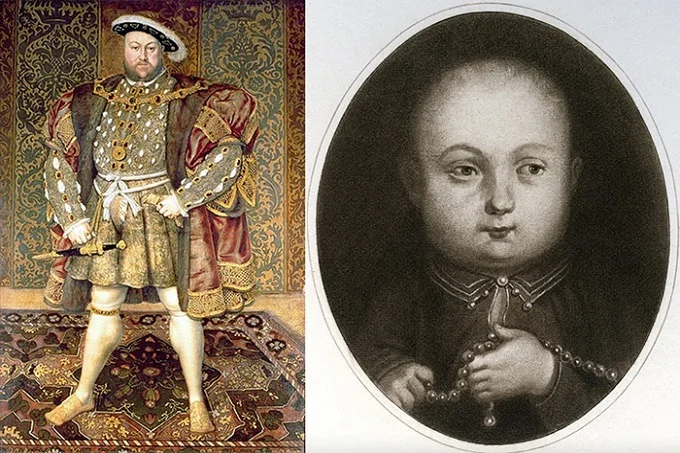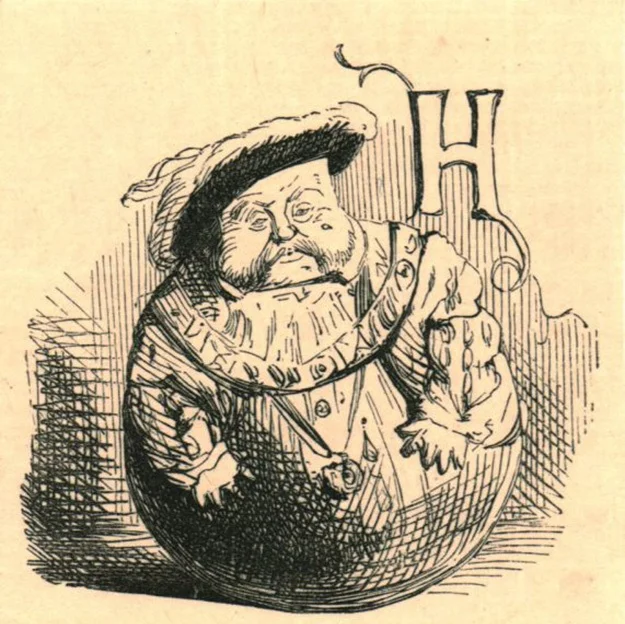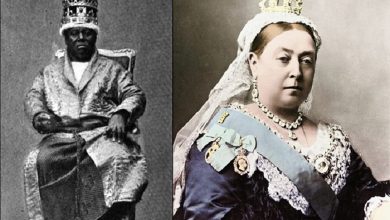How Henry VIII became paranoid and tyrant over a fateful knightly tournament

Henry VIII is one of the 100 Greatest Britons and one of history’s most renowned kings. When he reached the throne, he was greeted with tremendous expectations. He was youthful, dignified, smart, and well-educated. Heinrich was also a very ambitious and active person.
Henry VIII became a living emblem of the Renaissance for the British, but everything changed after a stunning occurrence during the knight’s tournament. From a vibrant, athletic youngster “with a flaming stare,” the monarch deteriorated into a ruthless, paranoid tyrant. Forever, the trajectory of British history has been thrown off…
On June 28, 1491, the future monarch was born in London. At initially, no high expectations were placed on him, and he was the second son of a royal couple from the United Kingdom. King Henry VII had seven children with his wife Elizabeth of York. Arthur, the oldest, was the successor to the kingdom. He had his own yard and lived apart from the rest of the family. A large number of carefully appointed personnel watched after Arthur. He’d been groomed for the throne his whole life.
History has been tinkered with by fate. Arthur died while he was a teenager from an illness. Henry ascended to the throne of the United Kingdom. Of course, he had a good education, but he wasn’t as well equipped for the king’s job. Henry’s mother, it seems, taught him how to write. He was adored and spoiled, but he wasn’t ready to be in charge of the state.
The monarch wished to keep the heir safe from any risk, no matter how little. A young guy who was enamored with athletics was barred from participating in any physical activity. They also made the decision for Henry to marry.
The father wished for his son to marry Arthur’s widow, Catherine of Aragon. When all of the legalities were completed, and the consent of the Church was gained, the engagement took place.
The marriage to Catherine was completed when Henry VIII arrived on the throne in 1509. Both Henry and his wife were well-liked by the public. The youthful monarch was held in high regard. They anticipated him to bring long-awaited peace, which would inevitably be followed by widespread wealth and tranquility.
At first, Henry seemed to totally justify all of his citizens’ wishes. His attitude to public policy was measured and prudent. The monarch desired to be surrounded by individuals who were not just noble and wealthy, but also brilliant and bright.
The monarch was very aware of the perilous nature of his position at court. After all, he was up against other prospective rivals in the royal race. Henry disposed of everyone in a thorough and meticulous manner. The courtiers were not oppressed by the monarch, and he was a generous and kind person.
Furthermore, the king had lofty ambitions for the future. He bolstered the army and increased the fleet’s size. He encouraged the theater and welcomed many outstanding poets, musicians, and artists to the court. His father bequeathed a big fortune to his kid. He wasted everything throughout his rule, but it was all for the sake of the nation.
Henry waxed eloquently about military triumphs. He gave it his all in order to achieve glory in this sector. The monarch swung back and forth between numerous alliances, picking the most lucrative ones. He married his younger sister to King Louis XII of France because of political considerations. The successors courted daughter Mary to the Spanish and French thrones on many occasions. Most of all, the monarch wished for a son. He diligently awaited an heir from his wife for two decades. However, this never came to pass.
The birth of a bastard from Henry’s liaison with one of the Queen’s maids of honor was the last straw in Henry’s forbearance. He made the decision to divorce Catherine of Aragon. At this same moment, the monarch was taken away by Anne Boleyn, a young and lovely girl. She was clever and well-educated. She also shared all of Henry’s interests. Knightly tournaments were the king’s major vulnerability. He enjoyed not only organizing events but also participating in them personally.
It was the year 1536. Greenwich Palace hosted another knightly contest. Up until a certain point, everything was perfectly normal. Henry lost his footing after a forward toss and fell from his horse in less than a minute. The horse, dressed for battle, collided with the king’s head. Everyone became very still. For two hours, the monarch did not come to his senses. Nobody believed that he would ever wake up. The worst thing is that Anna was already pregnant and for a long time at that time. From the news of the injury and the possible death of her husband, she suffered a miscarriage.
Henry was dealt a double blow when he regained consciousness. Not only was he gravely hurt, but all of his ailments worsened, and the long-awaited heir’s aspirations were dashed. After that, the king’s personality started to shift in an unfavorable way. He became distrustful, ruthless, and choosy. He had lost faith in even his closest friends. Anna was not only banished but also killed six months after the occurrence, which was unsurprising.
Historians think Henry had previously suffered major head injuries. His lifestyle, according to experts, was more akin to that of a stuntman than that of a pampered king. For him, the most recent episode proved to be lethal. Henry most likely suffered from a brain hemorrhage, according to the experts. As a result, he had such drastic personality changes. The king married four more times in the years after this occurrence. He got increasingly irascible and unpredictable with time.
Not only did the trauma cause brain damage, but it also aggravated the leg’s varicose ulcers. The monarch was unable to participate in his beloved knightly tournaments anymore. The tall guy started to grow in size as a result of his lack of physical exercise. It simply widened in size.
Henry had gained an unattractive amount of weight. He morphed from a charismatic young guy into a big man who was always unhappy with life and tyrannized everyone around him.
Debilitating sleeplessness, excruciating headaches, and memory lapses all contributed to the negative mood. In his latter years, the monarch suffered from despair and impotence. True, he had finally obtained an heir at this point. Many jokes were made about the king. He was enraged, and he exacted vengeance on anybody who had fallen victim to his wrath. Of course, this in no way excuses his heinous actions, but it does help us understand him.

Henry was afflicted with a variety of ailments at the end of his life. The wretched man’s whole body was covered with boils and sores, and he was suffering from gout. He couldn’t move because of the extreme fullness, and the excruciating pangs drove him insane. His condition could not be improved by the court physicians. On January 28, 1547, he died, leaving behind Edward VI, who was still a minor.




